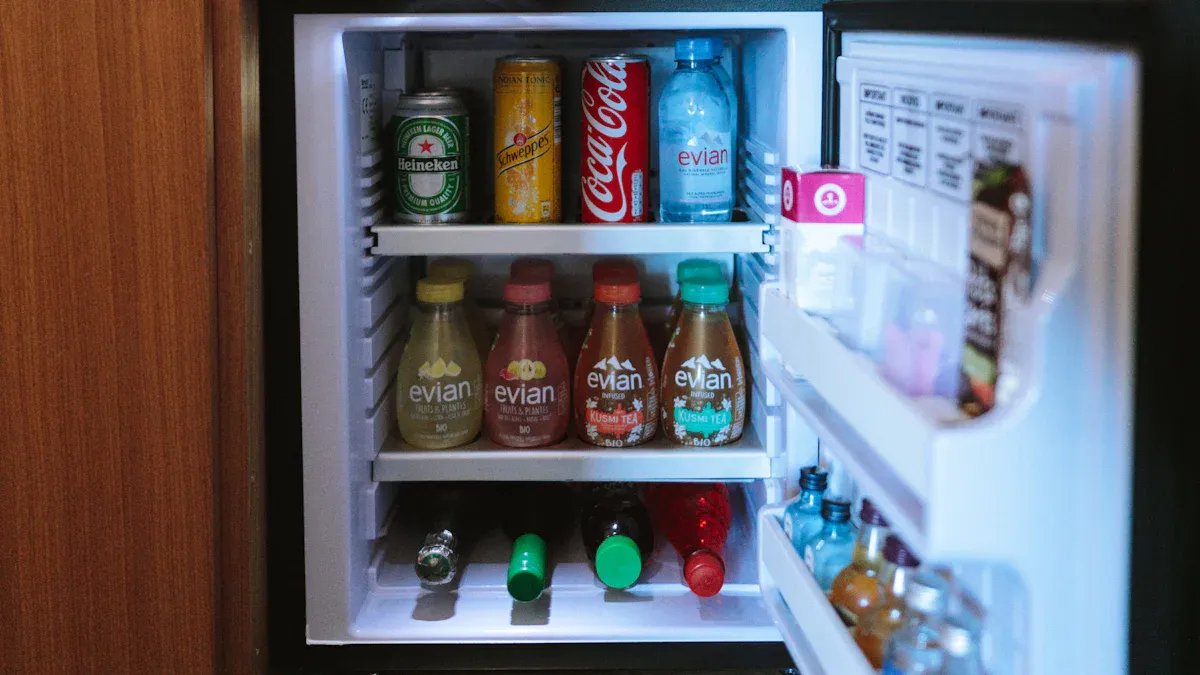
A portable freezer for car journeys ensures food and beverages remain fresh and ready to enjoy. These devices, like mini portable coolers, offer convenience and prevent spoilage during long trips. With advanced features, a portable cooler fridge serves various needs, while a portable car refrigerator provides a reliable solution for preserving perishables on the go.
Benefits of Using a Portable Freezer for Car

Convenience for Travel and Outdoor Activities
A portable freezer for car journeys offers unmatched convenience for travelers and outdoor enthusiasts. These devices simplify food storage and eliminate the need for frequent stops to purchase fresh supplies.
- The global market for portable refrigeration solutions is growing rapidly, valued at approximately USD 1.9 billion in 2023 and projected to reach USD 3.2 billion by 2032.
- This growth reflects increasing demand for portable freezers in outdoor recreational activities.
Portable freezers are lightweight and easy to transport, making them ideal for road trips, camping, and picnics. Their adjustable temperature settings and rapid cooling capabilities ensure food and drinks stay fresh. Additionally, their low power consumption and durable construction make them reliable for extended trips.
Preserving Perishables on the Go
Preserving perishables during travel becomes effortless with a portable freezer for car use. These devices maintain consistent temperatures, preventing spoilage and ensuring food safety. Travelers can store fresh produce, dairy products, and frozen items without worrying about melting ice or fluctuating temperatures.
Portable freezers also reduce food waste by keeping leftovers fresh for longer periods. This feature is especially beneficial for families and groups traveling together, as it minimizes the need to discard unused food.
Versatility for Different Storage Needs
Portable freezers cater to a wide range of storage requirements, making them a versatile addition to any journey. They operate on DC power, allowing seamless use in vehicles. Unlike traditional coolers, they eliminate the need for ice packs, providing a hassle-free cooling solution.
Available in various sizes, portable freezers accommodate everything from beverages to groceries. Some models offer dual-zone functionality, enabling users to refrigerate and freeze items simultaneously. This flexibility makes them suitable for road trips, camping, and even professional use.
The National Park Service reported over 327 million visitors to national parks in 2020, highlighting the growing popularity of outdoor activities. Portable freezers meet the needs of this expanding market by offering reliable and adaptable cooling solutions.
Types of Portable Freezers for Cars

Choosing the right portable freezer for car use depends on understanding the different types available. Each type offers unique features and benefits, catering to various needs and preferences.
Thermoelectric Models
Thermoelectric portable freezers use Peltier technology to maintain cool temperatures. These models are lightweight, compact, and budget-friendly, making them ideal for short trips or occasional use. However, they are less efficient in extreme heat compared to other types.
Key performance metrics for thermoelectric models include:
- Cooling capacity: Up to 74.7 W.
- Power consumption: Minimum 138.8 W.
- Cooling rate: Exponential, taking approximately 69 minutes to cool water from 32°C to 6°C.
| Performance Metric | Thermoelectric | Vapor Compression | Stirling |
|---|---|---|---|
| Cooling Capacity | Up to 74.7 W | N/A | N/A |
| Coefficient of Performance | Max 0.45 | N/A | N/A |
| Power Consumption | Min 138.8 W | N/A | N/A |
Thermoelectric models are best suited for users seeking an affordable and portable solution for light cooling needs.
Absorption-Based Models
Absorption-based portable freezers excel in energy efficiency by utilizing waste heat or solar energy for refrigeration. These systems are environmentally friendly and ideal for remote areas where electricity may be limited.
Advantages of absorption-based models include:
- Ability to harness low-grade waste heat from industrial processes.
- Compatibility with solar energy, reducing carbon footprints.
- Enhanced efficiency through advanced heat exchangers and quality insulation.
These freezers are perfect for eco-conscious travelers or those venturing into off-grid locations.
Compressor-Based Models
Compressor-based portable freezers dominate the market due to their superior cooling capabilities. They maintain consistent temperatures, making them suitable for extended outdoor use and long-term storage.
Benefits of compressor-based models include:
- Precise temperature control, maintaining temperatures around 0°F or below.
- Reliable performance in extreme conditions, ideal for outdoor enthusiasts.
- Greater efficiency compared to thermoelectric models, making them suitable for larger vehicles.
Compressor-based freezers are the go-to choice for users requiring robust and reliable cooling solutions for their journeys.
How to Use a Portable Freezer for Car
Setting Up Your Freezer
Proper setup ensures optimal performance and longevity for a portable freezer for car use. Begin by selecting a stable and flat surface inside the vehicle to place the freezer. This prevents vibrations and movement during travel. Ensure adequate ventilation around the unit to avoid overheating. Most models require at least 2-4 inches of clearance on all sides.
Before powering the freezer, inspect the power cord and plug for any damage. Connect the freezer to the appropriate power source, such as the car’s 12V DC outlet or a portable power station. Adjust the temperature settings based on the items being stored. For frozen goods, set the temperature to 0°F or below. For beverages or fresh produce, a range of 32°F to 40°F works best.
Tip: Pre-cool the freezer at home using an AC outlet before transferring it to the car. This reduces the initial power load and ensures faster cooling during travel.
Powering Your Freezer: Options and Best Practices
Portable freezers offer versatile powering options, making them adaptable for various travel scenarios. Users can choose from several efficient methods:
- Battery Isolators: These devices prevent the freezer from draining the car’s main battery. They allow the alternator to charge both the main and auxiliary batteries simultaneously.
- Portable Power Stations: Rechargeable battery packs provide a reliable power source without relying on the car battery. These are ideal for extended trips or camping.
- Solar Power Solutions: Solar panels offer an eco-friendly alternative, reducing dependence on traditional power sources. They also provide long-term savings for frequent travelers.
For maximum efficiency, pre-cool the freezer before use and pack items strategically. Insulation covers help maintain internal temperatures, reducing power consumption.
Note: Compressor-driven models are particularly energy-efficient, making them suitable for long journeys. They maintain consistent cooling even in extreme conditions.
Tips for Efficient Operation
Efficient operation of a portable freezer for car use enhances its performance and reduces energy consumption. Follow these practical tips:
- Pack Smartly: Arrange items to maximize space and airflow. Avoid overloading the freezer, as this can hinder cooling efficiency.
- Use Insulation Covers: These covers minimize heat transfer, keeping the freezer cool for longer periods.
- Monitor Temperature Settings: Adjust the temperature based on the contents. Lower settings for frozen goods and higher settings for fresh produce ensure optimal cooling.
- Avoid Frequent Openings: Limit the number of times the freezer is opened during travel. Each opening allows warm air to enter, increasing the power load.
- Regular Maintenance: Clean the freezer after each trip to prevent odors and ensure smooth operation. Check for any wear and tear on power cords and seals.
Pro Tip: Hybrid models combine the features of portable fridges and ice coolers, offering rapid cooling without constant power usage. These are ideal for users seeking flexibility during short and long trips.
Choosing the Right Portable Freezer for Car
Size and Capacity Considerations
Selecting the right size and capacity for a portable freezer for car use ensures it meets specific storage needs without compromising vehicle space. The freezer’s capacity determines the types and quantities of items it can store, making it essential for trips of varying durations.
| Aspect | Importance |
|---|---|
| Capacity | Determines types and quantities of food and drinks that can be stored, crucial for trips. |
| Size | Affects placement and usable space in the vehicle, essential for fitting the model appropriately. |
To make an informed decision:
- Estimate the required storage space based on the trip duration and the number of travelers.
- Measure the designated area in the vehicle to ensure the freezer fits properly.
- Consider the freezer’s door configuration for easy access during travel.
Larger freezers suit extended journeys, while compact models work best for short trips or smaller vehicles. Dual-zone models, which allow simultaneous refrigeration and freezing, offer added flexibility for diverse storage needs.
Power Source Compatibility
Power source compatibility plays a critical role in the functionality of portable freezers for cars. Most models operate using the car’s 12V DC outlet, providing a reliable power source during travel. However, alternative power options enhance versatility and ensure uninterrupted operation.
- Portable Battery Packs: Rechargeable batteries provide power when the car engine is off, making them ideal for camping or extended stops.
- Solar Panels: Eco-friendly and cost-effective, solar panels reduce reliance on traditional power sources.
- Dynamic Battery Protection Systems: Advanced models, such as the Dometic CFX-75DZW, include features like automatic shutoff to protect the car’s starter battery.
When choosing a freezer, consider the available power sources and the freezer’s energy efficiency. Compressor-based models, known for their low power consumption, are particularly suitable for long journeys.
Durability and Additional Features
Durability ensures a portable freezer withstands the rigors of travel, while additional features enhance user convenience. Manufacturers design automotive portable freezers with robust exteriors to endure harsh conditions, catering to both recreational and commercial applications.
Innovative features include:
- Wi-Fi Connectivity: Allows users to monitor and control the freezer remotely.
- LED Lighting: Improves visibility, especially during nighttime use.
- Eco-Friendly Options: Reflects growing consumer demand for sustainable products.
For example, the Bodega portable car refrigerator offers a 24-month warranty on its compressor, demonstrating the manufacturer’s confidence in its durability. Such warranties provide peace of mind and indicate the product’s reliability.
When evaluating additional features, consider the freezer’s purpose. Models with advanced insulation and temperature control are ideal for preserving perishables, while compact designs suit casual users.
Common Challenges and How to Solve Them
Managing Power Consumption
Efficient power management is crucial for portable freezers, especially during extended trips. Users often face challenges like battery drainage or inconsistent power supply. To address these issues:
- Use a Battery Isolator: This device prevents the freezer from depleting the car’s main battery. It ensures the vehicle starts reliably, even after prolonged use.
- Invest in a Portable Power Station: Rechargeable power stations provide a backup energy source, reducing reliance on the car battery.
- Optimize Temperature Settings: Lowering the cooling intensity when storing non-perishable items minimizes energy consumption.
Tip: Pre-cool the freezer at home before travel. This reduces the initial power load and enhances energy efficiency.
Cleaning and Maintenance Guidelines
Proper cleaning and maintenance extend the lifespan of portable freezers. Neglecting these tasks can lead to unpleasant odors or reduced performance. Follow these steps:
- Unplug the Freezer: Always disconnect the power source before cleaning.
- Wipe Interior Surfaces: Use a soft cloth and mild detergent to clean the interior. Avoid abrasive cleaners that may damage the surface.
- Inspect Seals and Vents: Check door seals for wear and clean vents to ensure proper airflow.
Note: Regular maintenance prevents mold growth and ensures optimal cooling performance.
Troubleshooting Performance Issues
Portable freezers may occasionally encounter performance issues, such as inconsistent cooling or unusual noises. Address these problems with the following solutions:
- Check Power Connections: Ensure the power cord is securely plugged into the outlet. Inspect for any visible damage.
- Monitor Temperature Settings: Incorrect settings may cause cooling inconsistencies. Adjust as needed.
- Inspect for Blockages: Obstructions in vents or fans can hinder airflow. Clear any debris to restore functionality.
Pro Tip: Refer to the user manual for specific troubleshooting steps. Contact the manufacturer for assistance if issues persist.
Portable freezers enhance car journeys by offering reliable cooling solutions for food and beverages. Their portability suits road trips and outdoor activities, while energy-efficient designs protect vehicle batteries. Users appreciate their performance, often comparing them favorably to pricier alternatives.
- Efficient cooling eliminates the need for ice.
- Compact designs simplify transportation.
- Battery-saving features ensure uninterrupted operation.
Exploring available options helps travelers find the perfect freezer to elevate their adventures.
FAQ
How long can a portable freezer run on a car battery?
Most models operate for 6-8 hours on a fully charged car battery. Using a battery isolator extends runtime without draining the main battery.
Can portable freezers handle extreme outdoor temperatures?
Compressor-based models perform well in extreme conditions. Thermoelectric models may struggle in high heat, making them less suitable for intense outdoor environments.
Are portable freezers noisy during operation?
Modern portable freezers, especially compressor-based ones, operate quietly. Noise levels typically range between 35-45 decibels, ensuring minimal disturbance during travel.
Post time: Jun-05-2025

